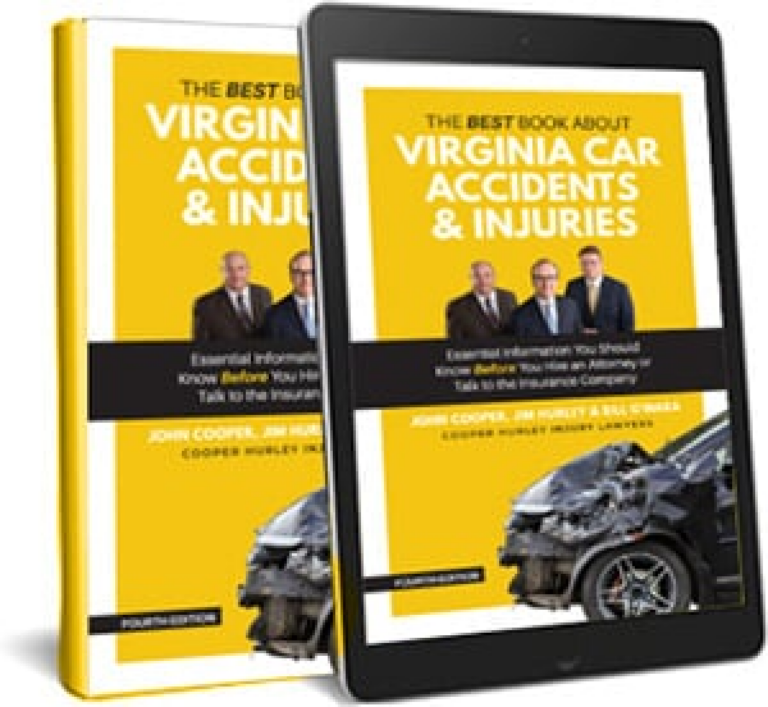Virginia Truck Accident Lawyer
When you’ve been hurt in a truck crash, choosing the right Virginia truck accident lawyer can make a difference in your case outcome. With proven results in Coastal Virginia, Cooper Hurley Injury Lawyers is known throughout the region as the car crash experts. We represent clients throughout Virginia and have 9 office locations including Virginia Beach and Suffolk. Our team of skilled injury attorneys will fiercely advocate for your interests and fight for the compensation you deserve.
On This Page
- Why Work With a Truck Accident Lawyer After Your Accident in Virginia?
- Meet the Award-Winning Team at Cooper Hurley Injury Lawyers
- Causes of Truck Accidents in Virginia
- Types of Truck Accident Cases We Handle
- Common Injuries in Truck Accidents
- Available Damages in a Truck Accident
- A Virginia Truck Accident Attorney Can Help You Prove Fault
- FAQs About Truck Accidents in Virginia
- Contact a Virginia Truck Accident Attorney from Cooper Hurley Injury Lawyers
Virginia is a major trucking route, connecting the entire Eastern Seaboard and funneling to several major ports. Unfortunately, that means truck accidents are common and a leading cause of personal injury in the Commonwealth. With seemingly endless commercial trucks driving through the state daily, there’s always the risk of a collision and serious injuries.
Cooper Hurley Injury Lawyers offers skilled and effective representation for victims of trucking accidents. If you need a Virginia truck accident lawyer, we have the experience and resources necessary to take on cases involving large national and independent trucking companies or other responsible parties.
We understand that a truck accident can be physically, emotionally, and financially devastating. Our Virginia truck accident attorneys will fight for the full and fair compensation you deserve. Bottom line: We get results. We won the second-largest car crash verdict in 2022 for one of our clients. Contact our office today to get your free case evaluation.
Why Work With a Truck Accident Lawyer After Your Accident in Virginia?
After a collision with a delivery truck, 18-wheeler, tractor-trailer, or any commercial vehicle, you will need help. Our truck accident lawyers offer many services to ease your burdens during a difficult time, including the following:
- Gathering evidence to prove fault and justify damages
- Discussing the incident with the police
- Investigating the accident to determine the cause and responsible parties
- Locating witnesses
- Determining sources of insurance coverage
- Negotiating with insurance companies
- Seeking the best possible results, including through litigation, if necessary
Truck accident cases are highly complex. A skilled Virginia big rig accident lawyer will immediately secure any video recording or the black box from the trucking company before evidence mysteriously disappears. Hiring an accident reconstruction specialist to prove your case may also be necessary.
We understand your expenses can pile up quickly after a wreck. We will fight for compensation for your medical expenses, lost wages, pain and suffering, vehicle repairs, and other damages.
Meet the Award-Winning Team at Cooper Hurley Injury Lawyers
Hiring an experienced Virginia truck injury lawyer is essential if you or a loved one suffered injuries in an accident due to another party’s negligence. It also makes you more likely to get a favorable case outcome. But whom you hire can make a significant difference in the amount of your award.
Cooper Hurley Injury Lawyers are known the car crash experts in Hampton Roads for several reasons:
- Our team was recognized as Top Lawyers by Super Lawyers, Coastal Virginia Magazine, and Top 100 Trial Lawyers in Virginia.
- Our founding partner, John Cooper, has over 30 years of experience litigating complex injury cases.
- We only represent accident victims, never the insurance companies.
- We take your case on contingency, meaning you pay us no upfront fees, and we only get paid if we win your case.
Client satisfaction means everything to us. We offer a free consultation so you can sit down and tell us your story. From there, we can discuss your options and build a strong case to seek the most favorable outcome.
We've Won Some of the Highest Verdicts and Settlements in Virginia
No attorney can promise a specific case outcome. But when you’ve been seriously hurt, the stakes are too high to take a chance on a firm that doesn’t produce results.
Cooper Hurley Injury Lawyers has established a track record of impressive case results in accident cases throughout Virginia, including the following:
- $6 million settlement ranked as the eighth-highest settlement in Virginia in 2022
- $5 million verdict for a Hampton woman injured by a truck driver in Gloucester County
- $2.46 million verdict ranked the second-highest car crash verdict in 2022
- $800,000 for a woman killed in a tractor-trailer accident
- $500,000 for a man injured in an accident with a truck
Contact our office today for a free consultation.
Causes of Truck Accidents in Virginia
If you wish to receive compensation, it’s critical to establish another party’s negligence caused the accident. The most prevalent causes of truck accidents in Virginia include:
- Speeding
- Cellphone use
- Driver fatigue
- Prescription drug use
- Bad weather
- Aggressive driving
- Tailgating
- Exterior distraction
- Illegal maneuvering
- Unfamiliarity with roads
- Missing blind spots
- Inattentive driving
- Inadequate supervision or oversight
- Mechanical errors
- Improperly loaded trucks
Many of these factors are due to truck driver error. An FMSCA Large Truck Crash Causation Study found that driver error accounted for 87 percent of recorded crashes.
Types of Truck Accident Cases We Handle
Large commercial trucks have limited maneuverability and visibility. Countless types of accidents can happen with these vehicles, many with disastrous consequences. Some of the most common types of truck accidents we handle include:
- Jackknife accidents
- Rollover truck accidents
- Side impact truck accidents
- Wide-turn accidents
- Underride truck accidents
- Blind spot truck accidents
- Head-on collisions
- Truck tire blowouts
- Fatal truck accidents
Cooper Hurley Injury Lawyers are Virginia’s car crash experts. We understand these crashes’ unique causes and effects and the laws that impact them.
Common Injuries in Truck Accidents
Tractor trailers weigh up to 80,000 pounds, making them up to 30 times heavier than passenger vehicles. They also have several blind spots, large turning radiuses, and require a long distance to stop.
The Virginia Highway Safety Office reported 52 fatal large truck crashes in 2021. Yet only six fatalities were truck drivers, meaning nearly all were other vehicle drivers, passengers, or pedestrians.
The results can be devastating for those who have been in a collision with a large truck. According to one study, some of the most common truck accident injuries include:
- Broken bones
- Spinal cord injuries
- Traumatic brain injuries
- Soft tissue injuries
- Internal injuries
- Paralysis
Available Damages in a Truck Accident
In Virginia, accident victims can recover both economic and non-economic damages. Economic damages are measurable, objectively verifiable monetary losses. These include the following:
- Medical bills
- Disability
- Lost wages
- Nursing care
- Physical therapy
- Vocational rehabilitation
- Lost job opportunities
- Property damage
Non-economic damages are more subjective. They refer to types of harm you incur that don’t come with a specific monetary cost yet can be devastating nonetheless. Examples include:
- Pain and suffering
- Emotional distress
- Loss of consortium, or the benefits of a family relationship
- Post-traumatic stress disorder
- Physical disfigurement
- Embarrassment
- Reduced quality of life
While both types of damages are available in a truck accident case, you must prove them. Your attorney will properly value all your damages related to your case and will fight to seek fair compensation for those losses.
A Virginia Truck Accident Attorney Can Help You Prove Fault
Virginia has fault-based insurance rules, meaning you must pursue compensation from the party responsible for your truck accident. Specifically, you’ll file a claim against the at-fault party’s insurance company. While this sounds straightforward, these claims can be complex.
A truck driver could be liable for causing an accident based on their actions. But other parties, such as the truck driver’s employer or a parts manufacturer, might also be responsible for your injuries.
If you cannot prove fault, you won’t be able to collect compensation, and an insurance company will look for every opportunity to avoid responsibility. Therefore, hiring a skilled accident attorney is always in your best interests.
Our Virginia Beach truck accident lawyers understand Virginia’s unique laws and federal regulations that apply to the trucking industry. We will conduct an independent accident investigation and even hire accident reconstruction experts when necessary to strengthen your case.

Ask The Car Crash Experts - Who's Liable for a Commercial Truck Accident?
Bailey Gifford, Personal Injury Lawyer
“If you’re hit by a commercial vehicle, it’s not just the driver who’s liable for any injuries they may have caused. The company that employs the driver at the time of the accident is also responsible for any injuries resulting from their employee’s actions.”
We Will Negotiate with Insurance Companies on Your Behalf
The last thing a truck crash injury victim should worry about is having enough money to get medical care and pay their bills. Even so, if you were injured in a crash with a commercial truck, you’ll find it’s a struggle to do just that.
Trucking companies and their insurers are not in the business of paying out large claims. They employ many dirty tricks to minimize and deny legitimate claims. For example, the insurance company might offer to only partially cover your medical bills, falsely blame you for the accident, or try to settle quickly with a lowball offer.
Cooper Hurley Injury Lawyers levels the playing field for our clients because we only represent accident victims, never insurance companies. We are experts in dealing with insurance representatives and will handle all negotiations on your behalf. To learn more about insurance company dirty tricks, download our free report.
Facing Trial? Work with an Experienced Trial Attorney
Not every case settles through negotiation. If an insurance company won’t be reasonable, it’s in your best interests to go to court with an experienced trial attorney if you believe you have a winning case.
As the claimant in a personal injury case, you have the burden of proof. This involves presenting evidence and eyewitnesses to prove negligence and justify damages. Our firm is highly experienced in navigating this process and will fight the insurance companies on your behalf.
FAQs About Truck Accidents in Virginia
Is Virginia a No-Fault Insurance State?
Virginia is an “at-fault” state regarding motor vehicle accidents, meaning the at-fault party will be financially responsible for your damages. In most cases, that party will have an insurance policy that covers some or all of these damages.
How Long Do I Have to File a Claim in Virginia?
In Virginia, you have two years to file a personal injury claim under the statute of limitations. If you miss this deadline, the court will not allow your suit to proceed. Still, don’t wait too long to file your claim. Witnesses and evidence can disappear quickly. If you’ve been hurt, contact a Virginia semi truck accident lawyer immediately to discuss your options.
What if My Accident Involved a Government Vehicle?
Sometimes, government entities own and operate trucks for various purposes. Perhaps the county uses trucks to collect garbage, or a city operates them for road maintenance. If you’re in a crash with a government vehicle, the laws related to filing a claim will be different. There will be shorter time limits for filing a case and possibly caps on compensation. A qualified attorney will be critical to your efforts.
Who Should You Sue for Commercial Truck Accidents—the Business or the Driver?
Every truck accident is unique. A trucking company, truck driver, truck manufacturer, or several other parties could be held responsible for your harm. For example, a trucking company may be at fault for poor applicant screening, bad scheduling, or inadequate driver training. A driver could be liable for reckless, distracted, or drunk driving. In addition, if the driver is an employee of the trucking company, the company may be responsible as an employer. These are complex issues your attorney can help sort out.
How Much Is My Truck Accident Case Worth?
The damages available following a crash with a truck will depend partially on the type and severity of your injuries. There may be minimal compensation if the wreck only caused property damage. But the damages could be extensive if your injuries were catastrophic or permanent.
Proving liability and damages are necessary to win a case. But you can’t trust an insurance company to do the right thing. Our firm has a proven track record of winning big settlements for accident victims. We promise to fight just as hard for you.
What If the Truck Accident Was My Fault?
If you shared fault for the accident, you may be unable to collect compensation. Virginia is one of the few states following a pure contributory negligence rule, meaning you can’t collect if you are found to share any blame for the accident.
However, don’t believe what the insurance company representatives tell you. More importantly, avoid admitting fault to anyone. A seasoned accident attorney can review the details of your case and advocate for a positive result whenever possible.
Contact a Virginia Truck Accident Attorney from Cooper Hurley Injury Lawyers
Cooper Hurley Injury Lawyers is a premier personal injury law firm in Coastal Virginia. If you’ve been injured in a truck accident, you deserve a Virginia truck accident lawyer who cares about your outcome and will fight for the results you deserve.
We’re Virginia Beach’s car accident experts, and we handle truck accident cases throughout the region:
Our award-winning Virginia truck accident attorneys have over 128 years of combined experience and have won millions for clients like yourself. We want to help.
We offer a free no-obligation consultation. Moreover, you only pay if we win your truck accident case. Contact us today and get your free case evaluation now.
Find Out What Your
Case is Worth
Testimonials



Free eBook

Get a free copy of “The Best Book About Virginia Car Accidents & Injuries”
Learn what to do after an accident, how to deal with insurance agencies, and when to get help. Download your free copy of The Best Book About Virginia Car Accidents & Injuries.



